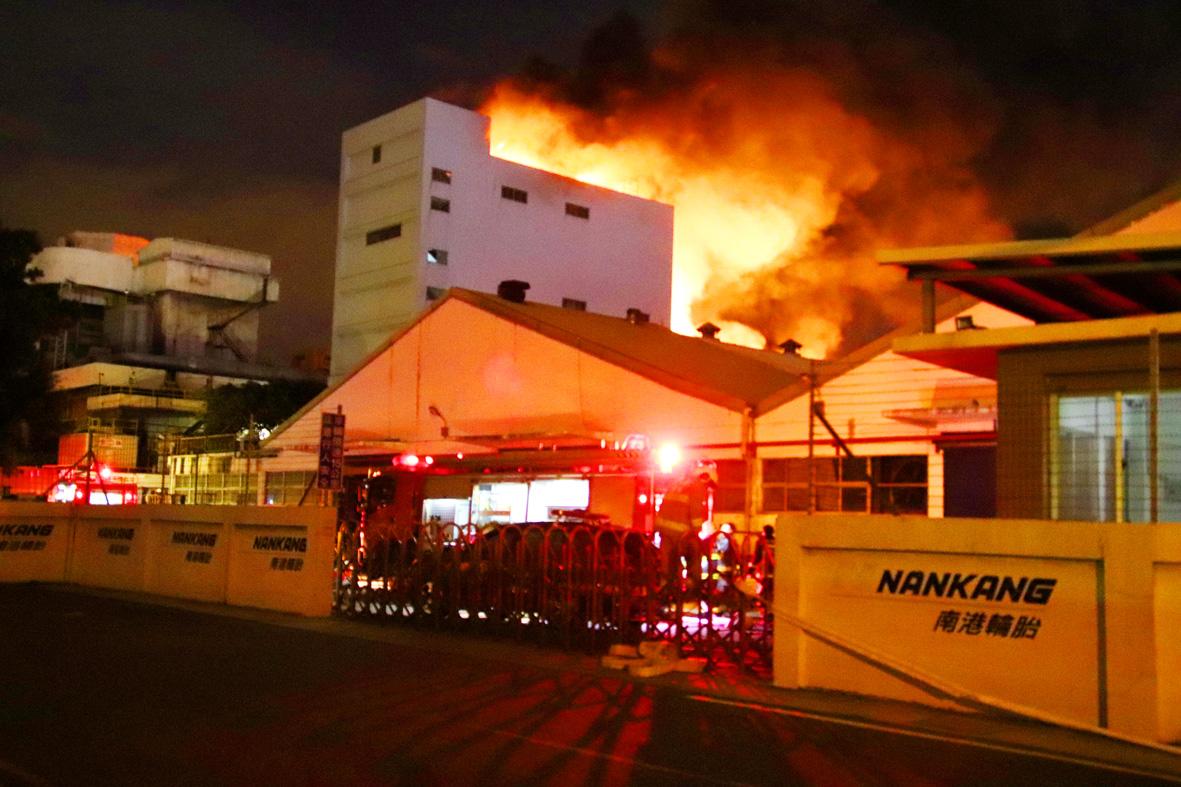The cause of a fire late on Saturday at a Nankang Rubber Tire Corp (南港輪胎) plant in Hsinchu County’s Sinfeng Township (新豐) is under investigation, but the blaze is not expected to have a major effect on operations, the company said yesterday.
The fire began about 11:30pm on Saturday, and was extinguished about 1am yesterday, it said.
There were no casualties and damage to the plant was limited, the nation’s second-largest tire maker said in a regulatory filing.

Photo: Huang Mei-chu, Taipei Times
A preliminary investigation indicated the fire broke out in a machinery room on the top floor of a building outside the production plant, Nankang said.
There were no raw materials, semi-finished products or finished products at the site, so there were no chemical leaks or emissions that could harm human health, despite what some local media reports said, Nankang said.
Determining whether the blaze was sparked by overheating machinery or some other problem would have to wait until technicians arrived at the plant today to investigate the fire, it said.
“As the affected area is not the main production area, and the fire was extinguished in a timely manner, losses were controlled to a certain extent,” Nankang said, adding that it was fully insured against fires.
With some internal adjustments, it would be able to maintain normal operations, it added.
Nankang reported revenue of NT$1.96 billion (US$66.44 million) in the second quarter, down 15.7 percent from the first quarter and 19.7 percent from a year earlier, mainly due to lower shipments amid the COVID-19 pandemic.
However, shipments have improved every month over the quarter, and monthly sales growth remained in the positive territory in May and June compared with the decline seen in April, company data showed.
In the first half of the year, revenue totaled NT$4.16 billion, down 28.65 percent from a year earlier.
Nankang has yet to release its financial results for last quarter. In the first quarter, it reported a net loss of NT$128.38 million, compared with net income of NT$216.29 million a year ago.

In Italy’s storied gold-making hubs, jewelers are reworking their designs to trim gold content as they race to blunt the effect of record prices and appeal to shoppers watching their budgets. Gold prices hit a record high on Thursday, surging near US$5,600 an ounce, more than double a year ago as geopolitical concerns and jitters over trade pushed investors toward the safe-haven asset. The rally is putting undue pressure on small artisans as they face mounting demands from customers, including international brands, to produce cheaper items, from signature pieces to wedding rings, according to interviews with four independent jewelers in Italy’s main

Japanese Prime Minister Sanae Takaichi has talked up the benefits of a weaker yen in a campaign speech, adopting a tone at odds with her finance ministry, which has refused to rule out any options to counter excessive foreign exchange volatility. Takaichi later softened her stance, saying she did not have a preference for the yen’s direction. “People say the weak yen is bad right now, but for export industries, it’s a major opportunity,” Takaichi said on Saturday at a rally for Liberal Democratic Party candidate Daishiro Yamagiwa in Kanagawa Prefecture ahead of a snap election on Sunday. “Whether it’s selling food or

CONCERNS: Tech companies investing in AI businesses that purchase their products have raised questions among investors that they are artificially propping up demand Nvidia Corp chief executive officer Jensen Huang (黃仁勳) on Saturday said that the company would be participating in OpenAI’s latest funding round, describing it as potentially “the largest investment we’ve ever made.” “We will invest a great deal of money,” Huang told reporters while visiting Taipei. “I believe in OpenAI. The work that they do is incredible. They’re one of the most consequential companies of our time.” Huang did not say exactly how much Nvidia might contribute, but described the investment as “huge.” “Let Sam announce how much he’s going to raise — it’s for him to decide,” Huang said, referring to OpenAI

The global server market is expected to grow 12.8 percent annually this year, with artificial intelligence (AI) servers projected to account for 16.5 percent, driven by continued investment in AI infrastructure by major cloud service providers (CSPs), market researcher TrendForce Corp (集邦科技) said yesterday. Global AI server shipments this year are expected to increase 28 percent year-on-year to more than 2.7 million units, driven by sustained demand from CSPs and government sovereign cloud projects, TrendForce analyst Frank Kung (龔明德) told the Taipei Times. Demand for GPU-based AI servers, including Nvidia Corp’s GB and Vera Rubin rack systems, is expected to remain high,